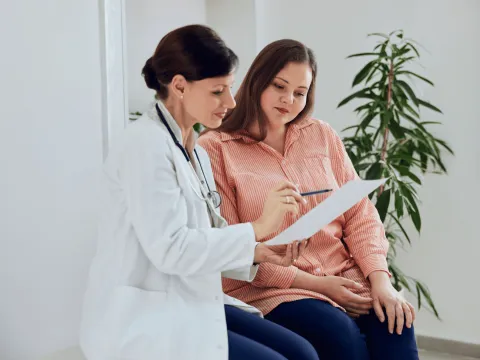- AdventHealth

“Breast cancer is the second leading cause of cancer death in women in the U.S., so staying on top of your annual mammograms could save your life,” says Leena Kamat, MD, a board-certified radiologist specializing in breast imaging.
With getting used to new routines, you may be feeling like days have gotten even more hectic lately. But scheduling important health care appointments, like regular preventive mammograms, should still be a priority.
The American College of Radiology (ACR) explains that a mammogram is a non-invasive X-ray used to check breasts for breast cancer and other abnormalities. And, most importantly, it’s the only test shown to reduce breast cancer deaths.
Early Detection Saves Lives
Since 1990, research has shown that mammograms have saved between 384,000 and 614,500 lives. To put these staggering numbers in perspective, they’re more than double the mid-sized city population in the U.S.
But only about half of women over 40 get regular mammograms. That means breast cancer is taking lives that it wouldn’t if more women knew the value of getting a mammogram.
Screening Mammograms
“Our advanced digital and 3D mammogram technology can detect breast cancer up to two years earlier than self-examination,” says Dr. Kamat. “That’s why it’s so critical to get your screening mammograms.”
In fact, evidence continues to show that 3D mammograms are better at finding cancer. An October 2018 study that tracked 15,000 women over five years found that 3D mammography detected 30% more cancers than traditional mammography. And we know that when cancer is found in its earliest stages (often because of routine mammograms), women are more likely to make a full recovery – and less likely to need aggressive treatment to get there.
A screening mammogram offers the best chance of early detection. Catching breast cancer early means:
- Therapies, like breast conservation therapy, will be most effective
- Treatment can begin early, possibly before the cancer spreads to other parts of your body
- You’ll have the best possible chance for a full recovery
If you’re curious about what will happen during your mammogram, check out our post on what to expect.
When Should I Get a Mammogram?
Many factors determine when you should have a mammogram, such as your family history, risk factors and age. Screening mammograms are recommended at least every two years, starting between the ages of 40 and 50. “Any woman who is experiencing unusual breast symptoms, no matter her age, should notify her doctor,” Dr. Kamat says.
We offer convenient mammogram appointments year-round. And if you have insurance, it’s likely that 100% of the cost of a screening mammogram will be covered.
Mammograms may also be available to uninsured and underserved women in our community through AdventHealth Foundation and other local organizations.
We’re Taking Extra Precautions for Your Protection
We’ve enacted new safety measures to ensure you can schedule a mammogram and visit your doctors with confidence and peace of mind. When you visit an AdventHealth facility for a mammogram, you’ll see these precautions in action:
- Universal mask use for health care providers and patients
- Ability to check in from your car on your mobile device (in certain locations)
- Social distancing measures in waiting areas (floor markers and seat covers)
- Temperature checks at all facility entrances
Schedule a Mammogram
Getting regular mammograms is beneficial to your body and mind, as you’ll know you’re doing everything you can to protect yourself from breast cancer. Scheduling your mammogram online is fast and easy, and it could save your life. Take charge of your health, today.



